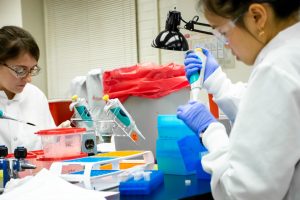Essential Functions
Essential functions are the physical, intellectual and behavioral requirements of the program that a student must be able to master in order to successfully participate in the CLS program and become employable. Examples of the program’s essential functions are provided below. In compliance with the National Accrediting Agency for Clinical Laboratory Science (NAACLS), the CLS program makes these essential functions available to prospective students and the public. Prospective students who are not sure that they will able to perform these essential functions should consult with the CLS admissions chair for further information and to discuss individual situations.
Visual Skills

A student in the CLS program must possess sufficient visual skills to perform and interpret laboratory assays and receive non-verbal communication appropriately. Examples of visual skills include the ability to:
- read calibration lines on pipettes and laboratory instruments that are one millimeter apart.
- distinguish between solutions that are clear, opaque or particulate in test tubes and on glass slides.
- identify stained and unstained cellular components in the range of one micrometer using a binocular brightfield microscope.
- differentiate color reactions.
Manipulative Skills
A student must also possess adequate manipulative skills to perform a variety of laboratory assays. Examples of manipulative skills include the ability to:
- turn dials, press keypads and move switches on laboratory instruments.
- use a rubber bulb to draw liquid into a marked pipette and then use a gloved finger to control the release of that liquid to within one millimeter of a fixed point on the pipette.
- isolate bacteria in microbiology by smoothly moving a loop (a 12 inch wire with a looped end) over the surface of an agar (gel) culture plate without tearing the surface of the agar.
Intellectual Skills
A CLS student must possess a range of intellectual skills that allows him or her to master the broad and complex body of knowledge that constitutes a clinical laboratory science education. A CLS student must be able to memorize, perform scientific measurements and calculations, and analyze and synthesize information from a wide variety of sources. A student must possess computational skills needed for laboratory math calculations such as the conversion of milliliters to microliters.
Attitudinal, Behavioral, Interpersonal, and Emotional Attributes
A CLS student must be of sufficient emotional health to fully use his or her intellectual ability, to exercise good judgment, to complete clinical responsibilities promptly, and to relate to patients, instructors, and colleagues with courtesy and respect. The ability to participate collaboratively and flexibly as a professional team member is essential. The CLS student must display this emotional health in spite of stressful work and changing environments. The CLS student must be able to modify behavior in response to constructive criticism.
An individual with a diagnosed psychiatric disorder may function as a CLS student as long as the condition is under sufficient control to allow accomplishment of the program’s educational goals with or without reasonable accommodation. The student must exhibit behavioral, emotional, and intellectual functioning that does not differ from acceptable standards. In the event of deteriorating function, it is essential that a CLS student be willing to acknowledge the disability and accept professional help before the condition poses danger to self, patients, instructors, or colleagues.
Communication Skills
A CLS student must be able to ask questions, respond to verbal instructions and record information accurately. The student must be able to communicate effectively and efficiently with instructors, clinical laboratory staff and patients. This must include spoken communication and non-verbal communication such as interpretation of facial expression, affect, and body language. Mastery of both written and spoken English is required.
Additional Program Expectations
In addition to the essential functions listed above, all students are expected to:
- Comply with the UNC-CH Honor Code and UNC Campus Code.
- Report to classes and laboratories on time, and notify the appropriate instructor in case of unavoidable delay or absence.
- Complete all course assignments on time.
- Work cooperatively with instructors, other students, and clinical laboratory personnel.
- Maintain grades of C-(70%) or higher in all courses.
- Complete all required documentation, including immunization and training requirements and annual criminal background checks, in a timely fashion.
- Follow all safety guidelines as outlined in the safety guidelines and laboratory rules.
- Conform to the required dress code.
- Participate in clinical rotations at UNC Hospitals and other (off-campus) clinical laboratories as assigned. Note that some rotations may begin as early as 7:00 a.m., and that students are responsible for their own transportation.
- Demonstrate professional conduct and interpersonal skills with patients, laboratory personnel, other health care professionals, and the public.
- Adhere to ethical standards in all matters related to medical information and patient care.
Failure to meet these expectations will result either in an offer of admission being rescinded, or in dismissal of an enrolled student. A more complete discussion of these expectations may be found in the Division of CLS Policies. If you have any questions or concerns about these expectations or your ability to meet them, please share these during the admissions process.